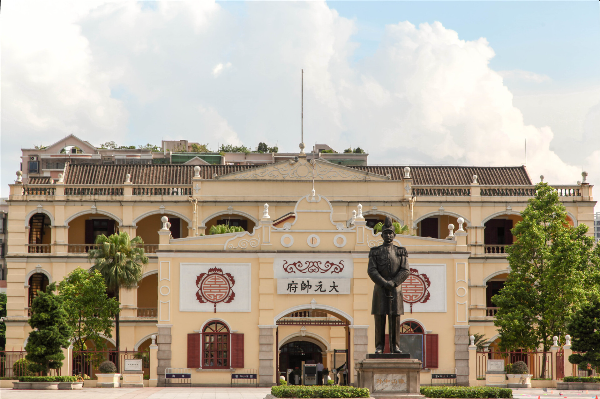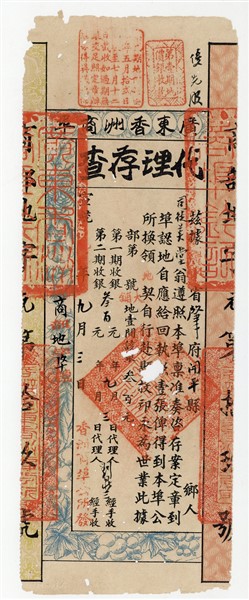Recently, the list of the fifth batch of national first-class museums in China was unveiled, including five museums in Guangdong, namely the Memorial Museum of Generalissimo Sun Yat-sen's Mansion, Guangdong Museum of Revolutionary History (Guangzhou Modern History Museum), Memorial Museum of 1911 Revolution, Zumiao Museum (Ancestral Temple), and Jiangmen Museum.
Before that, Guangdong had 10 national first-class museums.
May 18 marks the International Museum Day. Here is a guide for you to embark on a cultural journey in these 5 museums!

Memorial Museum of Generalissimo Sun Yat-sen's Mansion, Guangzhou (孫中山大元帥府紀(jì)念館)
Located on the southern bank of the Pearl River, the former site of Generalissimo Sun Yat-sen's Mansion has been transformed into a memorial museum. Between 1917 and 1925, Dr. Sun established the revolutionary government twice in this mansion.


(Photo: Memorial Museum of Generalissimo Sun Yat-sen's Mansion)
The complex comprises two Victorian-style buildings, displaying Guangzhou's history of the revolutionary era and offering insights into the life and great deeds of the forerunner of China's democratic revolution.


(Photo: Memorial Museum of Generalissimo Sun Yat-sen's Mansion)
Ongoing exhibition: Wisdom from China - Chinese Export Porcelain's Influence on the West

Opening hours: 8:30 to 17:30 (closed on Monday)
Add.: No. 18, Dongsha Street, Fangzhi Road, Haizhu District, Guangzhou (廣州市海珠區(qū)紡織路東沙街18號(hào))
Guangdong Museum of Revolutionary History, Guangzhou (廣東革命歷史博物館)
Guangdong Revolutionary History Museum (Guangzhou Modern History Museum) is an important revolutionary site. For instance, after the outbreak of the Wuchang Uprising on October 10, 1911, revolutionaries in Guangdong gathered here to declare the independence of Guangdong.

(Photo: Guangdong Museum of Revolutionary History)
This thematic museum collects over 65,000 cultural relics and documents as well as 25,000 historical photos, presenting Guangdong's revolutionary history over the past century.


Opening hours: 9:00 to 17:30 (closed on Monday)
Add. (Guangzhou Modern History Museum): No.2, Lingyuan West Road, Yuexiu District, Guangzhou (廣州市越秀區(qū)陵園西路2號(hào))
Memorial Museum of 1911 Revolution, Guangzhou (辛亥革命紀(jì)念館)
Xinhai Revolution Memorial Hall, located on Changzhou Island in Guangzhou's Huangpu District, was established in 2011 on the occasion of the 100th Anniversary of the 1911 Revolution (or Xinhai Revolution).

(Photo: Memorial Museum of 1911 Revolution)
Two exhibitions are set up in the hall, each themed on the 1911 Xinhai Revolution and famous people in Guangdong. Through the handwriting, oil paintings, sculptures, and photos, visitors can catch a glimpse of the great changes in modern Chinese society.



(Photo: Memorial Museum of 1911 Revolution)
Furthermore, a batch of bronze statues are set up on the two sides of a long corridor, depicting revolutionists like Zou Rong, Lu Haodong, Qiu Jin, and Cai Yuanpei.

Opening hours: 9:00 to 17:00 (closed on Monday)
Add.: No. 563 Jinzhou North Road, Changzhou Island, Huangpu District, Guangzhou (廣州市黃埔區(qū)長(zhǎng)洲金洲北路563號(hào))
Zumiao Museum, Foshan (佛山祖廟博物館)
Built during the Northern Song Dynasty (1078-1085), the Zumiao (Ancestral Temple) is the epitome of Foshan's history and culture. It features ancient buildings with ceramic images on the eaves, regular Cantonese opera and lion dance performances, as well as the memorial halls of Kung Fu masters Ip Man and Wong Fei-hung.



(Photo: Zumiao Museum)
To celebrate International Museum Day, Zumiao Museum will hold a local version of the "Museum and Relevant Products and Technologies Exposition" from May 17 to 19. Meanwhile, from May 17 to June 23, visitors can also enjoy an exhibition on the inscription and documents of Zumiao and an exhibition featuring 101 Shiwan ceramic sculptures.

(Photo: Zumiao Museum)
Opening hours: 8:30 to 18:00 (closed on Monday)
Tickets: 20 yuan (50 percent discount offered on May 17-19)
Add.: No.21 Zumiao Road, Chancheng District, Foshan (佛山市禪城區(qū)祖廟路21號(hào))
Jiangmen Museum (江門市博物館)
Jiangmen Museum is a comprehensive museum that oversees the China Qiaodu Museum of Overseas Chinese, Chen Baisha Memorial Hall, the old site of Xinning Railway Beijie Station, the former site of Diaotai Courtyard, and other venues.
The China Qiaodu Museum of Overseas Chinese houses more than 40,000 pieces (sets) of cultural relics, including passports, Qiaopi (comprising a letter and a remittance certificate, which served as a bond between Chinese emigrants and their families back home), and other collections.


(Photo: Jiangmen Municipal Culture, Radio, Television, Tourism and Sports Bureau)
Chen Baisha was a local scholar during the Ming Dynasty who was enshrined in the Confucian Temple. At the Chen Baisha Memorial Hall, visitors can not only learn about Chen's life story, but also experience calligraphy using the Maolong brush created by Chen and rubbing art.



(Photo: Jiangmen Municipal Culture, Radio, Television, Tourism and Sports Bureau)
Opening hours: 9:00 to 17:00 (closed on Monday)
Add.:
China Qiaodu Museum of Overseas Chinese: 132 meters southwest of the intersection of Fazhan Avenue and Guangchang East Road, Pengjiang District, Jiangmen (江門市蓬江區(qū)發(fā)展大道與廣場(chǎng)東路交叉口西南方向132米)
Chen Baisha Memorial Hall: No.37 Baisha Avenue West, Pengjiang District, Jiangmen (江門市蓬江區(qū)白沙大道西37號(hào))
All materials marked with "source: English.gz.gov.cn" on this website (including but not limited to text, photographs, audio and video materials) are the copyrighted property of Guangzhou International (the official website of Guangzhou Municipality). Without prior authorization from Guangzhou International, any media, website, organization or individual shall not transmit, interlink, distribute or republish such materials in any form. Any media and website authorized to republish such materials shall mark them with "source: Guangzhou International (English.gz.gov.cn)". Infringement of these copyrights will result in legal action.
